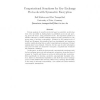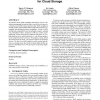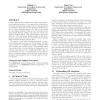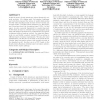CCS
2009
ACM
15 years 7 months ago
2009
ACM
Formal analysis of security protocols based on symbolic models has been very successful in finding flaws in published protocols and proving protocols secure, using automated too...
96
Voted
CCS
2009
ACM
15 years 7 months ago
2009
ACM
Role mining algorithms address an important access control problem: configuring a role-based access control system. Given a direct assignment of users to permissions, role mining...
82
Voted
CCS
2009
ACM
15 years 7 months ago
2009
ACM
We introduce the concept of membership-concealing overlay networks (MCONs), which hide the real-world identities of participants. We argue that while membership concealment is ort...
126
Voted
CCS
2009
ACM
15 years 7 months ago
2009
ACM
The abuse of online games by automated programs, known as game bots, for gaining unfair advantages has plagued millions of participating players with escalating severity in recent...
CCS
2009
ACM
15 years 7 months ago
2009
ACM
We describe CoSP, a general framework for conducting computational soundness proofs of symbolic models and for embedding these proofs into formal calculi. CoSP considers arbitrary...
93
Voted
CCS
2009
ACM
15 years 7 months ago
2009
ACM
We introduce HAIL (High-Availability and Integrity Layer), a distributed cryptographic system that allows a set of servers to prove to a client that a stored file is intact and r...
CCS
2009
ACM
15 years 7 months ago
2009
ACM
Software flaws in native methods may defeat Java’s guarantees of safety and security. One common kind of flaws in native methods results from the discrepancy on how exceptions...
78
Voted
CCS
2009
ACM
16 years 1 months ago
2009
ACM
Despite several research studies, the effective analysis of policy based systems remains a significant challenge. Policy analysis should at least (i) be expressive (ii) take accou...
CCS
2009
ACM
16 years 1 months ago
2009
ACM
Denial of Service (DoS) attacks are serious threats for network societies. For dealing with DoS attacks, Jakobsson and Juels first proposed the notion of useful client puzzles (UC...
100
Voted
CCS
2009
ACM
16 years 1 months ago
2009
ACM
This paper proposes a D-algebra to compose decisions from multiple access control policies. Compared to other algebrabased approaches aimed at policy composition, D-algebra is the...




